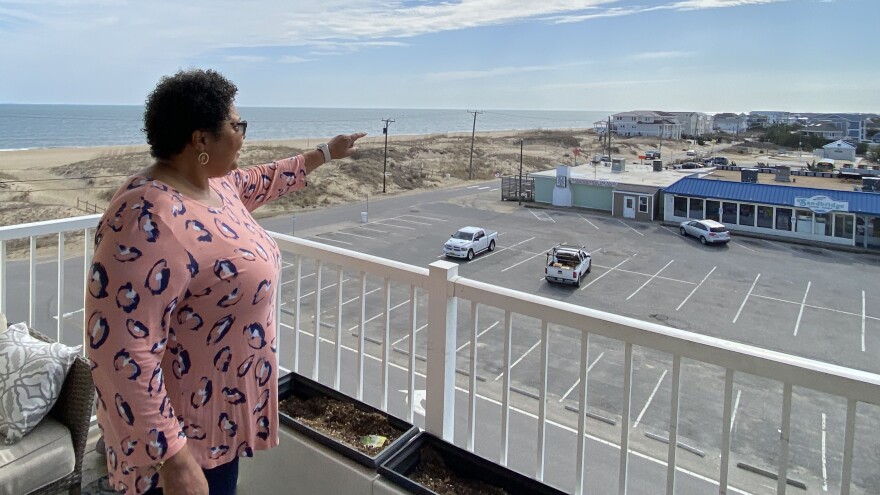Gabriele Mack moved to Sandbridge a few years ago to be near family, after retiring from a longtime job in northern Virginia.
She said she feels blessed every morning to wake up to the expansive view of the Atlantic Ocean.
But Mack worries a new project could threaten the community’s peaceful atmosphere. Her balcony view also looks over a public parking lot now at the center of intense community debate.
She’s one of hundreds of residents who are opposed to a proposal from Portland-based Avangrid Renewables to route six transmission cables from an offshore wind project through the Sandbridge parking lot.
The company, which is not affiliated with Dominion Energy’s wind project off the coast of Virginia Beach, is planning to build an offshore wind farm about 27 miles east of Corolla on the Outer Banks.
They still need federal permitting for the Kitty Hawk North Wind project, as well as a buyer for the energy produced.
Avangrid says the project could contribute to the local renewable energy supply and that research shows the cables are safe.
Sandbridge residents are concerned that the industry is too new to know the infrastructure’s potential harms, and that the city should slow down the process before approving the project.
“As a mother and a grandmother, of course I want to reduce our dependence on fossil fuel, for the safety of our nation and for our environment,” said decades-long resident Aileen Black. “But we shouldn’t rush into this the way that we are. … We need to get this right for our kids.”
Avangrid spokesperson Craig Gilvarg said in an email that the Kitty Hawk project “represents a historic opportunity for Virginia and the Hampton Roads region.”
It has “the potential to generate at least 3,500 megawatts, power 1 million homes with clean energy, create thousands of jobs, and help the region attract additional economic investments including local manufacturing,” Gilvarg wrote.
“Wind is developed in a manner that minimizes impacts and provides significant local benefits. We remain committed to that work and will continue to engage with local leaders and stakeholders to bring this substantial, clean, and cost-effective energy to the region.”
The company hopes to run the six cables under the ocean floor and Sandbridge Beach to a city-owned parking lot next to Sandbridge Seaside Market, then extending to the Corporate Landing Business Park.
The cables would be placed at least 3 feet underground inside of duct banks made of thermal concrete designed to dissipate heat, according to a company presentation.
Avangrid acknowledges there will be “minor, short-term impacts to nearby residents” during construction as with any infrastructure project.
The company also said it would not do construction between May and October, the community’s heaviest tourist season.
Taylor Adams, Virginia Beach deputy city manager and director of economic development, recently told City Council “the only impact will be a single manhole cover post-construction that you will be able to see in the parking lot.”
Residents are not convinced. They’ve formed a coalition called Protect Sandbridge Beach that urges people to sign a petition against the project.
The group cites several reasons for the opposition, including disruption to local businesses and community members from the six years of construction officials estimate it will take.
They are also concerned about impacts to the environment both in the ocean and around the beach, and potential health effects from the cables’ electromagnetic fields.
Avangrid says the fields will be no more than a common household appliance, and that because they’re underground, will be undetectable at the surface.
The U.S. Environmental Protection Agency says research has not clearly shown whether exposure to the electromagnetic radiation increases cancer risk. A few studies have connected it to health effects including impacts to devices like cardiac pacemakers.
Mack said she wants to see more community outreach from Avangrid.
“My biggest concern is that there are all these issues looming, and yet our elected officials who are … trying to move this thing forward are relying on information that's incomplete.”
Sandbridge’s issue is not isolated. It’s one of many communities along the East Coast learning how to handle new challenges related to the growing offshore wind industry.
Current federal lease opportunities for offshore wind total about 1.7 million acres from North Carolina to Delaware, according to the Bureau of Ocean Energy Management.
Mack said she worries that once the infrastructure goes up in Sandbridge, other projects within those lease areas will want to capitalize on it, putting further pressure on the small community.
A city spokesperson declined to comment on the issue, saying the City Council has not yet taken a position.
City Council members have requested that Avangrid hold more community meetings about the project before they vote on any further approvals.
BOEM expects to complete an environmental review of the wind farm proposal late next year.
Editor’s note: Ashley McLeod is a member of WHRO Public Media’s Board of Directors and works for Avangrid Renewables. WHRO’s newsroom is editorially independent.





